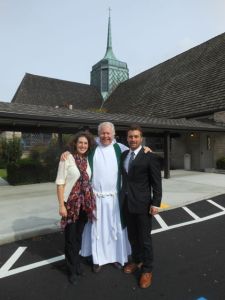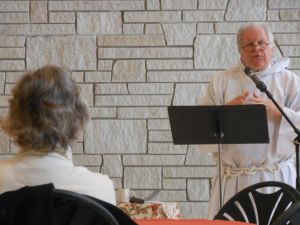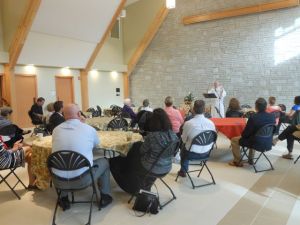Last Sunday I was in Seattle for Cristosal’s Executive Committee meeting. We were hosted by St. Thomas in Medina, where the Rev. Lex Breckenridge spoke during the Sunday forum about the intersection of religion and science. Lex was one of the first folks to open my eyes beyond gut reactions to words like conversion, transformation, even Jesus. To the idea that these are just words, and spirituality is a personal experience, and therefore a personal interpretation of what we want those words to mean to us. They can be offensive, neutral, healing, transformative, challenging… it’s up to you.
Much of this past year has been a personal journey to unify three seemingly disparate worlds that I walk in: the lofty scientific, the inner spiritual, and the very real lived experience of Cristosal’s human rights work with marginalized communities in El Salvador.
Lex highlighted the problem that when we choose between scienceor religion, we hold these fields to a moral ideal, an absolute standard as the answer. Yet both are flawed: technological innovation brings us nanotechnology and the hydrogen bomb, religion inspired the globe-shifting acts of both Martin Luther King and the Crusades. To pursue one without the other (faith without reason, reason without faith) is to lose those checks and balances that mean we make choices for the benefit of others, not solely ourselves.
One of my favorite philosophers says that change happens when we look at the world as it is, and compare it to way we think it should be. And that starts with recognizing that we don’t truly understand the world as it is. Lex highlighted recent studies in quantum physics showing that our world does not operate as mechanistically as we’d like to believe. Quantum particles, separated over light years, continue to have an inexplicable influence over one another, to be connected despite every basic law that would suggest otherwise.
I moved to El Salvador with the understanding that reason alone would not allow me to understand the world, nor give me the complete skill set I needed to change it. One of the great opportunities of working with Cristosal is the opportunity to understand human rights in a faith-based context. I’ve realized that our work is truly an expression of faith – a belief that all humans are created equal in dignity and rights. We then take that belief and design programs to ensure it is upheld in realty. Which quickly becomes a very messy, and very human, process. And through that experience, I have made a very calculated, and very comforting deduction. It cannot be done alone.
In a culture where we value individual achievement beyond all else, I (like those quantum physicists) have come to the conclusion that nothing exists in isolation. Whether we pursue a better life, a better world, through science or faith (and any other field besides), we will find that nothing can be achieved without the other.
A dear friend of mine Ashley Cameron, who just returned from her YASC year in the Philippines, sent me this quote from Archbishop Desmond Tutu that sums it up perfectly:
“A person is a person through other persons. None of us comes into the world fully formed. We would not know how to think, or walk, or speak, or behave as human beings unless we learned it from other human beings. We need other human beings in order to be human. I am because other people are.”

Noah, Lex, and I outside of St. Thomas
I return to El Salvador on Monday for my second year with YASC. Though there are arbitrary date markers of start and stop, this year will continue as a process, a continuously evolving product of the relationships I share and the conversations we have together. Thank you to all of you who have been a part of that incredible process so far, and I hope you will continue to join me in the year to come.

